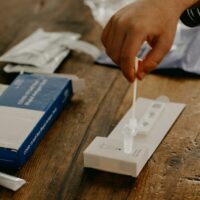The Christian County Health Department will close its free, drive-thru COVID-19 testing site at Tie Breaker Park on Dec. 31, the department announced Wednesday.
The local testing site — like many throughout the state — is funded, in part, by CARES Act dollars, which expire on Dec. 30.
The federal funds allocated to the state and, in turn, to local governments pay for the cost of the PCR (polymerise chain reaction) tests administered at the Christian County site and the processing of those tests. The health department is responsible for staffing and site-related costs.
“There might be alternatives that we may be able to offer, but it’s going to be a very limited number, and we’re just not aware of that information right now,” County Health Director Kayla Bebout said during a media briefing on Wednesday.
The health department encouraged employers who depend on the site for employee testing to make adjustments to their plans. Bebout noted there will still be several locations for residents to be tested, including Jennie Stuart Health and First Care Clinic, as well as local primary care physicians’ offices.
The health department will continue administering rapid COVID-19 antigen testing, which it began offering this week, at its offices on Canton Street. However, asymptomatic individuals should not rely on antigen tests, which are only recommended for those who are exhibiting symptoms. Because antigen tests have a lower sensitivity threshold than PCR tests, they can result in a false negative result for asymptomatic individuals, according to the Centers for Disease Control and Prevention.
Health department urges against repeat testing for those who’ve tested positive
The health department also urged individuals who have tested positive for the virus and are in isolation to not continue testing throughout that period.
“We’re seeing numerous repeat testers who have already tested positive,” department spokeswoman Amanda Sweeney said. “They’re in quarantine and they’re coming through the test site over and over hoping for a negative test and, with the crowded numbers already, … those who are in the community who have not been tested may not be able to get tested.
“And that could mean additional and identified positive cases out in the community who could be spreading the virus.”
Expired funding could have COVID-19 contact tracing implications
With the expiration of the CARES Act funding, many health departments across the state are being forced to shift how they conduct contact tracing, which state officials say also needs greater public cooperation.
“The public health strategy for contact tracing depended on broad public participation — cooperating with the local health departments when a tracer calls, wearing masks, social distancing and testing,” Kentucky Cabinet for Health and Family Services policy advisor Mark Carter said Tuesday during the governor’s media briefing. “We simply haven’t had enough participation from the public and the resulting surge has overwhelmed contact tracing capacity.
“Another challenge is that federal funds from the CARES Act have made the statewide contact tracing and tracking information management system and surge staffing possible, but Congress has not taken any action on additional stimulus legislation to date. Currently, Kentucky and all other states are required to use all CARES Act funding by Dec. 30, 2020.”
In the last month, Christian County has seen a surge in COVID-19 cases, which has made the task of contact tracing more challenging — even though the state has temporarily provided contact tracers to help with the caseloads. Christian County set a new record for the total number of cases reported in a single month in November, with 959 residents testing positive for the virus. If that trend continues, the county could see 1,395 new cases in December, Sweeney said.
“When you take an additional 1,300, almost 1,400 cases, and you add it to [our current total], that would most certainly stretch our employees as we cover the contact tracing for all the additional cases — and I’m just talking about our health department staff,” Sweeney said.
“We’re currently stretched as it is, but with an increase like that, we could easily be overloaded.”
Similar trends have forced some health departments across the state to shift to a different model that relies on individuals who’ve tested positive to trace and notify their own close contacts.
“We’ve been very fortunate that we have not had to do that, and we hope to not have to do that, but there may be a point where we could,” Bebout said. “As much as possible, we’re gonna use as many of our staff as needed to try to get in touch with, not only every positive [patient] — because we will do that, for sure — but … the direct contacts of a positive [patient]. We’re going to try our hardest to ensure that we’re getting in contact with every single one of them, no matter if the COVID funding or CARES funding is not there.
“We want to make sure that people understand the guidelines and what is being asked of them so we can help mitigate this disease.”
Julia Hunter is the engagement editor for Hoptown Chronicle. Reach her at julia@hoptownchronicle.org.





